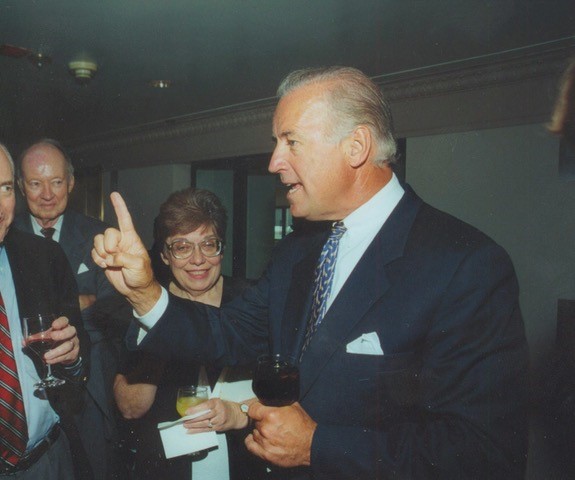NPC in History: The surprise after Joe Biden’s speech
Every president beginning with Theodore Roosevelt has spoken at the National Press Club either before, during or after his administration. With the election of Joe Biden, I checked his record.
Biden, a fixture of Washington politics for nearly 50 years, has visited the Club many times, speaking at seven luncheons from 1986 to 2007. He delivered one such speech during the first year of the George W. Bush administration
With the Senate evenly split following the 2000 election, Biden had just taken over the Senate Foreign Relations Committee when Sen. Jim Jeffords of Vermont switched his party affiliation to the Democrats.

After an unsuccessful presidential run in 1988, Biden was considered one of the potential Democrat candidates for 2004 when he made this speech. In introducing him, Club President Dick Ryan of the Detroit News noted that in the sixth grade in Wilmington, Del., Biden wrote that he either wanted to be a priest or the president.
“Well, he’s not a priest,” Ryan quipped.
Biden’s speech focused on the Bush administration’s proposal to drop its objections to China’s plan to build up its nuclear missile capability if China in turn would not object to the development of the president’s prized strategic missile defense system, called Star Wars when President Reagan first proposed it.
Biden said that was tantamount to trashing the Anti-Ballistic Missile Treaty that limited nuclear weapons.
Much of what Biden said in that speech seemed to presage many of his attacks on President Trump during the 2020 campaign for undermining NATO and unilaterally abrogating The Paris Peace Accords, the Iran Nuclear Treaty and missile defense treaties with the Russians.
The fall of the Berlin Wall and collapse of the Soviet Union presented the United States with an unparalleled opportunity to advance its ideals around the world, Biden told the Club that day. It should accept that role by living up to its obligations and treaties. Making such a deal with the Chinese would be a sign that America would “go it alone whenever it felt like it” to meet what he called an “almost theological allegiance” to the Strategic Defense Initiative.
“I don’t believe our national interest can be achieved in splendid indifference to the rest of the world’s views of our policies …” he said. “How we perform on that stage is as much about our honor, our decency and our pride as it is about strategic policy.
“Our interests are furthered when we meet our international obligations and when we keep our treaties ... when we stand together as democracies, multi-racial, multi-ethnic, multi-religious beacons of hope, not some dark house next door.”
He said the Defense Department’s Joint Chiefs of Staff have said a strategic nuclear attack on the United States is much less likely than many other forms of conflict for which the United States should be spending its money to prepare.
“We will have spent all of that money to address the least likely threat, while the real threat to the country comes in the hold of a ship, the belly of a plane, or smuggled into a city in the middle of the night in a vial and a backpack,” he said. “And what defense do we have to those things?”
So, what was the surprise after Joe Biden’s speech? Just look at the date: Sept. 10, 2001.
President Ryan gaveled the end of the luncheon exactly 20 hours and 46 minutes before the first plane commandeered by Osama bin Laden’s terrorist network crashed a hijacked airliner into the World Trade Center, changing the world in an instant.
Klein, a former National Press Club president, is author of "Tales from the National Press Club." The book highlights moments in which the history of the world, the nation, the capital and journalism intersect through events that occurred at the Club.
